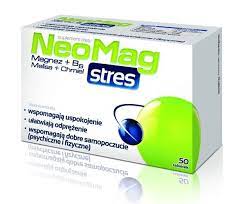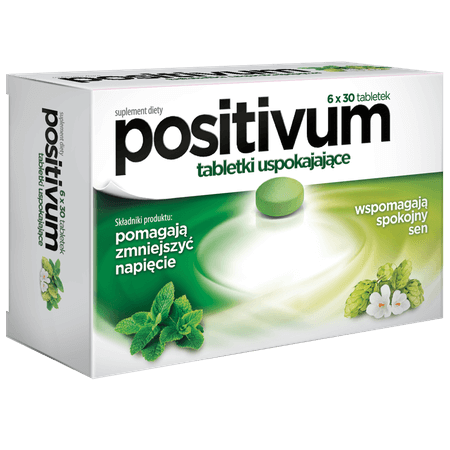Cortisol testing - standards, price, where to test, symptoms and indications
What cortisol testing is, why it is important and what symptoms should prompt you to do it.


Learn more about our editorial process
.

Learn more about our editorial process
.

Learn more about our editorial process
.
Why you can trust us
Articles on Natu.Care are written based on scientific research, data from government websites and other reliable sources. The texts are written in cooperation with doctors, nutritionists and other health and beauty experts. Articles are reviewed before publication and during significant updates.
.Learn more about our editorial process
.Information about advertisements
Content on Natu.Care may contain links to products from the sale of which we may receive a commission. When creating content, we adhere to high editorial standards and take care to be objective about the products discussed. The presence of affiliate links is not dictated by our partners, and we select the products we review ourselves completely independently.
.Learn more about our terms and Conditions
.Cortisol is nature's built-in 'alarm system'. It is one of the body's so-called stress hormones. Its normal levels are important for the function of many of our organs and systems. Cortisol influences blood glucose levels, regulates metabolism and affects the immune system. Therefore, it is worthwhile to test it regularly and ensure its correct concentration.
Cortisol testing is helpful in diagnosing the causes of ailments Insomnia, trouble concentrating, weight fluctuations, unstable mood, chronic fatigue - these are symptoms whose cause may be explained by abnormal cortisol concentrations.
.
From this article you will learn:
- What is cortisol and why it is important to test your cortisol levels .
- When should cortisol levels be tested .
- How the test looks like .
- Where to have the test, costs and reimbursement .
- How are abnormal cortisol levels manifested in the body
- How are cortisol levels found in the body?

Sprawdź, za co pokochały go tysiące klientek Wegańskie żelki na sen, Ashwagandha KSM-66, ananas. -15% z kodem BLOG15
Wegańskie żelki na sen, Ashwagandha KSM-66, ananas
Wreszcie się wyśpisz! Wegańskie żelki na sen z najwyższej jakości ashwagandhą KSM-66®, ekstraktami ziołowymi i tryptofanem utulą Cię do snu.
Zobacz cenę
Bez problemu wstaje rano z budzikiem, co wcześniej się nie zdarzało, mam więcej energiiEwa Szczapinska
See also:
- Blood tests [how often to do them + how to prepare]
- Thyroid tests [which ones to do + standards + results]
- Liver tests [what they are + when to perform]
If you notice symptoms in yourself as described in this article, consult your GP and arrange for tests.
Cortisol level tests: what they are and why they are important
.
Cortisol (hydrocortisone) is a natural glucocorticosteroid hormone produced by the striatal layer of the adrenal cortexand. Its concentration increases in stressful situations (physical or psychological) , which is why it is called the stress hormone.
Increased levels of cortisol are thought to help the body prepare for action - the evolutionary function of this hormone is simple. Cortisol helped us to survive in the face of sudden danger - attacks from wild animals or hostile tribes.
When the body is stressed, it is the body's job to prepare.
During a stressful situation, when the fight-or-flight response (fight or flight) is activated, concentrations of adrenaline, noradrenaline and cortisol, among others, increase. After the initial 'shock' of the stressful event, the body begins to regulate itself by lowering cortisol concentrations and normalising physiological responses.
What happens to your body during a fight or flight response?"
.
During stress, when the body is 'flooded' with hormones, there is: an increase in heart rate and blood pressure, accelerated breathing, pupil dilation, sharpening of the auditory organ, increased sweating, and a reduction in the perception of pain.
Functions of the body during stress include.
Functions of cortisol
.
Cortisol not only stimulates a stressful situation, it also has other important functions in the body. Cortisol is responsible forand:
- regulation of water and electrolyte balance, .
- regulation of protein, fat and carbohydrate metabolism, .
- regulation of blood glucose levels, .
- reduction of inflammation, .
- regulation of metabolism, .
- regulation of the immune system, .
- memory processes, .
Cortisol testing helps determine whether we have normal levels of it in the body - abnormal levels of this hormone can signal various diseases.
Long-term elevated levels of cortisol adversely affect the bodyand. Over time, it can lead to problems such as sleep disturbances, high blood pressure, diabetes, heart disease, mood swings, depressed mood leading to depression and weight gain..
 .
.
Witold Tomaszewskidoctor of medical sciences
."This is why it is so important to control the 'stress hormone', especially if we are accompanied by symptoms of unknown origin and basic blood tests show no abnormalities," the doctor adds.
Cortisol concentrations change with the diurnal rhythm. The highest concentration occurs in the morning and the lowest at midnight. This is a natural phenomenon. The problem is the chronic deviation from the norm, which requires finding the cause.
The problem is the chronic deviation from the norm, which requires finding the cause.
Indications for cortisol testing
.
Why are cortisol levels tested? As explained by Witold Tomaszewski, MD, PhD, the indications for cortisol testing are:
- the suspicion of diseases related to hormone abnormalities, e.g. Cushing's syndrome, Addison's syndrome, thyroid disease, .
- suspected tumours of the adrenal glands, ovary, testis, .
- depression, .
- insomnia, other sleep disorders, .
- chronic fatigue, .
- chronic stress, .
- hypertension, .
- control of this hormone with long-term intake of certain medications (e.g. corticosteroids taken internally as well as externally).
We should also be prompted to test for worrying symptoms, which you will read about below.
Symptoms of elevated cortisol
.
Do you suspect abnormal cortisol levels in yourself? Take note if you are experiencing the following symptoms.
Symptoms hypercortisolemia (excessive cortisol secretion)and:
- weight gain, mainly in the trunk and upper back area, .
- rounding of the face, .
- acne, .
- easy bruising, .
- reddened face, .
- slower healing, .
- severe fatigue, .
- irritability, .
- difficulty concentrating, .
- high blood pressure, .
- problems with fertility,
- lower libido,
- high blood pressure,
- high blood pressure,
- high blood pressure,
- high blood pressure.
- lower libido, .
- erectile dysfunction, .
- menstrual disorders, .
.
Symptoms of low cortisol
.
What can you experience when your cortisol levels are too low?
.
Symptoms of hypocortisolemia (lowcortisol concentration)and:
- prolonged fatigue, .
- reduced appetite, .
- unintentional weight loss, .
- low blood pressure, .
- decreased mood, .
- a desire to eat salty foods, .
- darkening of the skin (especially on the elbows and hands), .
- gastrointestinal disorders (diarrhoea, vomiting), .
- disorders of menstruation, .
- disorders of libido, .
Read why regular blood tests are important in the article: Blood tests: how to prepare, when and where to do them, how to interpret the results?
..
How does a cortisol test look like?
Cortisol testing is not as common as a morphology or lipidogram, but it is very simple to perform. How can you check your cortisol levels?
.
Blood test
.
The most common test for cortisol concentration is to take a blood sample from the elbow vein. The person taking the sample disinfects the skin in the area of the puncture and collects the material for the test. Afterwards, pressure is applied to the puncture site with a sterile gauze pad for about five minutes to prevent bruising and to speed up the healing of the wound.
The examination is usually painless, but may cause discomfort in some. If you are concerned about the insertion, tell the person taking the blood. It is helpful not to look at the moment of insertion and blood collection or to talk to temporarily distract you.
Daily urine collection
.
Cortisol can also be tested by daily urine collection. Determination of free cortisol in this way reflects its concentration in the blood over a given time interval.
Free cortisol can also be measured by a daily urine collection.
The researcher passes the first morning urine into the toilet, noting the time and date. He or she collects subsequent portions of urine into a container, by 7:00 am the following day, again noting the time and date the collection was completed.
Then the collection is completed.
After the collection is completed, the volume of urine collected should be measured, mixed and about 50 ml poured into a sterile container. The volume of urine collected and the time of collection should be noted on the container.
When Cushing's syndrome is suspected, the doctor may order both a blood test and a daily urine collection. The result of the blood test may be biased by the effect of stress on the patient, compared to the assessment of urinary cortisol excretion..
 .
.
Witold Tomaszewskidoctor of medical sciences
."This test is only applicable to the diagnosis of hypercortisolemia (excess cortisol), as cortisol is only filtered by the kidneys in its free form, unbound to proteins," explains Dr Tomaszewski.
The test is also used to diagnose hypercortisolemia.
Saliva test
.
The test involves taking 5-7 samples of saliva at specific times throughout the day. Cortisol secretion is characterised by a diurnal rhythm with a peak in secretion in the morning and a pit around midnight.
Five determinations of cortisol are performed.
Five determinations per day allow accurate assessment of changes in cortisol concentrations throughout the day. The patient collects the samples themselves and delivers them to the laboratory. Approximately 30 minutes before saliva is collected for the test, the patient should refrain from eating, drinking and brushing their teeth.
The patient's saliva should be collected in the laboratory.
Decamethasone inhibition test
.
If the results of other tests are inconclusive, the doctor may order functional tests, i.e. determination of cortisol levels after administration of dexamethasone (a synthetic glucocorticosteroid), explains Dr Witold Tomaszewski, M.D.
.
This test has several variants, and it is the doctor who decides how to perform it. It is an infrequently performed test, compared to a blood or urine collection.
The test is not often performed.
Dexamethasone should inhibit the secretion of cortisol, i.e. lowering its concentration in the blood relative to normal values. In the case of adrenal hyperfunction (excess cortisol secretion), a standard dose of dexamethasone will not inhibit the secretion of this hormone.
Testimonial doses of dexamethasone will not inhibit the secretion of this hormone.
Single-dose dexamethasone test (overnight dexamethasone inhibition test)
.
The test consists of oral intake of usually 1 mg of dexamethasone before bedtime, between 23:00 and 24:00, and measurement of serum cortisol levels the following day on an empty stomach between 8:00 and 9:00 a.m. Dexamethasone should inhibit cortisol secretion.
Test.
Liddel's test. Dexamethasone inhibition test, standard six days, with low and high dose of dexamethasone
.
The test lasts six days and is divided into stages:
- day 1 and 2 - 24-hour urine collection for urinary free cortisol excretion, .
- day 3 and 4 - morning (6:00 am) administration of 20 μg/kg body weight of dexamethasone in 4 divided doses, every 6 hours, .
- day 5 and 6 - morning (6:00 am) administration of 80 μg/kg body weight of dexamethasone in 4 divided doses, every 6 hours, .
On days 5 and 6, serum cortisol and ACTH (adrenocorticotropin - hormone) concentrations are also assessed at 8:00am and 8:00pm.
Dexamethasone inhibition test combined with CRH test
.
The test consists of a standard two-day test with low-dose dexamethasone. On the third day, synthetic CRH (corticocollaborin) is administered intravenously at a dose of 1 µg/kg body weight two hours after the last dose of dexamethasone.
.
Where to get a cortisol test?
.
Serum cortisol determination is a simple test that requires no special medical equipment or preparation. Read below what your options are for monitoring this hormone.
Private testing
.
You can have your cortisol levels tested in medical facilities and at home. It's convenient - you don't have to stand in line, risk infection, and the sample collection itself can be done in your comfort.
How much does it cost?
How much does a cortisol test cost? This depends on the method of collection and the individual laboratory's price list. Prices start at around £35.
The cost of a cortisol test can be reduced by up to £1,000.
Such tests can be carried out thanks to the experienced specialists at uPatient, who offer over 690 different tests and packages.
uPatient
.
Blood tests can be conveniently ordered and paid for online. A medical professional comes to your home and collects the material for the test there. The sample is transported to the laboratory under safe conditions. You can view the results online and then consult your doctor.
.
The uPatient portal allows you to test cortisol levels in children and adults. Below you can read about the possibilities of the test and the prices.
Cortisol test.
Price of the test
.
- Blood collection: from £127 .
- Daily urine collection: from £113 .
Tomorrow Medical
.
Tomorrow Medical is a network of outpatient clinics that offers high quality consultations with doctors and other specialists. Visits can be made in-store or online. With a modern, transparent mobile app, you are assured access to test results and the ability to keep in touch with your doctor.
What sets Tomorrow Medical clinics apart?
.
- No queues - thanks to the good organisation of appointments, patient service at the facility is efficient. You can have your appointments and examinations on the same day.
- No queues.
- Tomorrow Medical's doctors take an individual approach to the patient, paying attention not only to diagnosis and treatment, but also to prevention.
- No queues.
- .
Is cortisol testing on the National Health Service? Reimbursement
- .
Yes, cortisol testing can be performed free of charge based on a referral from a specialist, such as an emdocrinologist.
Note
.When arranging for a blood test, ask about packages that offer to check several parameters at a better price (e.g. a hormone test package). You will save money and get yourself examined comprehensively.
Cortisol testing - how to prepare?
- .
In order to get a reliable and accurate result, it is important to prepare before the test. Dr Witold Tomaszewski, M.D., indicates what to keep in mind.
- Cortisol exhibits diurnal variability, so the test should be performed in the morning, between 7:00 and 10:00.
- It is recommended that you take the test in the morning.
- It is recommended that the patient should be fasted and have their last meal approximately 8 hours before the test. .
- The day before the examination and on the day of the examination, excessive physical exertion should be avoided. .
- Before the intake, stress should be eliminated or minimised as much as possible.
- Prior to the intake, stress should be eliminated or minimised.
Cortisol levels - when to result?
- .
How long does it take to wait for the result of a cortisol level test depending on how the material is collected?"
- Blood test: 1-2 working days.
- Blood test: 1-2 working days.
- Daily urine collection: 1-5 working days.
- Blood test: 1-5 working days.
- Saliva examination: 1-5 working days.
- Daily saliva collection: 1-5 working days.
- .
Waiting time depends on the laboratory.
- .
Home cortisol test
- .
Be aware - there are no home tests to determine serum cortisol levels. We can only perform the test in a medical facility where we are guaranteed that the blood draw procedure is carried out correctly. Do not buy home tests, they do not work.
Cortisol test results - what do they mean?
- .
What are the normal cortisol concentrations in the body and how do you read the result? We explain.
Important
The following standards are indicative. When getting a result, refer to the reference range of the laboratory where you performed the test.
Cortisol - standards in adults and children
- .
Serum cortisol standards are closely related to the time of day. Approximate cortisol reference values are:
- Morning: 166-507 nmol/l, .
- Evening: 73.8-291 nmol/l.
- .
- .
Full interpretation of the results requires consideration of many factors and an individual patient approach. The doctor takes into account the symptoms present, any ongoing medications taken, the time the blood was drawn for the test and the change in cortisol concentrations from previous tests.
 .
.
Witold Tomaszewskidoctor of medical sciences
Interesting research
.Some studies suggest that daily vitamin D supplementation can lower blood and urinary cortisol levelsand. You can read more about vitamin D in the articles:
High cortisol
- .
Dr Witold Tomaszewski, M.D., points out what high cortisol levels can indicate.
High cortisol levels can be the result of:
- Cushing's disease, .
- Cushing's syndrome, .
- pregnancy, .
- significant obesity, .
- uncompensated diabetes, .
- alcoholism, .
- nutrition, .
- stress, .
- excessive physical exertion, .
- use of certain medications, .
Low cortisol
- .
What is indicated by low cortisol levels? It can be a symptom ofand:
- adrenal insufficiency due to damage to the adrenal cortex or pituitary gland, .
- Addison's disease, .
See also:
Supplements for stress and anxiety
Natu.Care Premium Magnesium + Vitamin B6
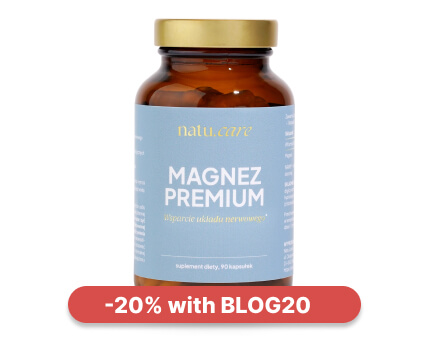
- Magnesium content per day: 305 mg
- Additional active ingredients: Vitamin B6 (2.1 mg)
- Form: capsules
- Serving size: 3 capsules per day
- Sufficient for: 30 days
Product description
The Premium Magnesium + Vitamin B6 dietary supplement is a comprehensive product that combines three organic forms of magnesium (citrate, malate, and diglycinate) and vitamin B6 in highly absorbable forms.
Magnesium is an essential mineral without which our bodies cannot function properly. It supports the immune, nervous, and muscular systems, maintains electrolyte balance, and is involved in cell division and the regulation of mental functions.
Research shows that magnesium supplementation is even more effective when accompanied by vitamin B6, which is included in our product. Vitamin B6 is responsible for the proper functioning of the nervous and immune systems, as well as the proper functioning of the heart.
If you want to safely get rid of feelings of fatigue, concentration problems, hair loss, muscle cramps, trembling, or irritability, reach for Premium Magnesium from Natu.Care, tested by the independent, certified laboratory J.S. Hamilton Poland.
Pros and cons
Pros
- Supports the proper functioning of the nervous and immune systems.
- Reduces feelings of fatigue and tiredness.
- Maintains proper psychological functions.
- The purity of the ingredients (free from anti-caking agents, artificial fillers, and additives such as titanium dioxide, microcrystalline cellulose, talc, magnesium stearate, and silicon dioxide) has been confirmed by laboratory tests.
- High absorption of ingredients.
- Soft capsules that are easy to swallow.
- Suitable for vegetarians and vegans.
Cons
- None.
Additional information
Take with a meal, 3 capsules per day.
The capsules should be taken with at least 250 ml of water.
If you have trouble sleeping, it is advisable to take 1 capsule in the morning and 2 capsules in the evening, no later than 4 hours before bedtime.
Avoid combining with products high in calcium (milk, yogurt, cheese), as this may negatively affect magnesium absorption.
Pregnant and breastfeeding women should consult a doctor before starting supplementation.
User review
I’m very impressed with the speed of delivery. The product itself is of high quality and absorbs well. After two weeks of supplementation, I’ve noticed a significant improvement in muscle recovery, especially during periods of intense training. I highly recommend it!
Sundose° Daily Glow°
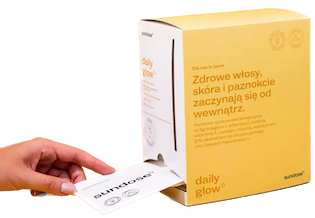
- Collagen content: 5000 mg collagen hydrolysate PEPTAN®
- Additional active ingredients: hyaluronic acid, coenzyme Q10, field horsetail extract, D-biotin, zinc, copper, vitamin A, vitamin C, manganese and omega-3 acids .
- Form: powder .
- Dose: one sachet + capsule
- Sufficient for: 30 days .
Product description
Daily Glow is a carefully composed formula based on PEPTAN® fish collagen and other valuable ingredients thatósupport the regeneration of dry skinóry, damaged hairów and brittle nails.
Pros and cons
Daily Glow is a carefully composed formula based on PEPTAN® fish collagen and other valuable ingredients thatósupport the regeneration of dry skinóry, damaged hairów and brittle nails.
Additional information
Daily Glow is a carefully composed formula based on PEPTAN® fish collagen and other valuable ingredients thatósupport the regeneration of dry skinóry, damaged hairów and brittle nails.
Daily Glow is a carefully composed formula based on PEPTAN® fish collagen and other valuable ingredients thatósupport the regeneration of dry skinóry, damaged hairów and brittle nails.
NeoMag Stress
Product description
Magnesium and vitamin B6 help to support the normal functioning of the nervous system and maintain normal psychological functions. Lemon balm herb extract helps to support good mood and normal cognitive function. Hops cone extract supports relaxation and physical and mental well-being. It also contributes to a restful and healthy sleep.
Pros and cons
Magnesium and vitamin B6 help to support the normal functioning of the nervous system and maintain normal psychological functions. Lemon balm herb extract helps to support good mood and normal cognitive function. Hops cone extract supports relaxation and physical and mental well-being. It also contributes to a restful and healthy sleep.
Additional information
Magnesium and vitamin B6 help to support the normal functioning of the nervous system and maintain normal psychological functions. Lemon balm herb extract helps to support good mood and normal cognitive function. Hops cone extract supports relaxation and physical and mental well-being. It also contributes to a restful and healthy sleep.
Expert opinion
ChillMe
Product description
ChillMe Health Labs Care is a multi-ingredient dietary supplement in capsule form, whichós formula has been developed for people with lifestyles that require focus and can lead to stressful situations. It combines four standardised herbal extracts from, amongst others, Asian basil leaves, green tea and witania spleen root.
Pros and cons
ChillMe Health Labs Care is a multi-ingredient dietary supplement in capsule form, whichós formula has been developed for people with lifestyles that require focus and can lead to stressful situations. It combines four standardised herbal extracts from, amongst others, Asian basil leaves, green tea and witania spleen root.
Additional information
ChillMe Health Labs Care is a multi-ingredient dietary supplement in capsule form, whichós formula has been developed for people with lifestyles that require focus and can lead to stressful situations. It combines four standardised herbal extracts from, amongst others, Asian basil leaves, green tea and witania spleen root.
Expert opinion
Positivum
Product description
Positivum is a dietary supplement which is a combination of natural ingredientsós derived from plants. The film-coated tablet formula will prove useful as a dietary supplement for adults.
Pros and cons
Positivum is a dietary supplement which is a combination of natural ingredientsós derived from plants. The film-coated tablet formula will prove useful as a dietary supplement for adults.
Additional information
Positivum is a dietary supplement which is a combination of natural ingredientsós derived from plants. The film-coated tablet formula will prove useful as a dietary supplement for adults.
Expert opinion
Summary
- .
From this article remember:
.- Cortisol is one of the stress hormones, along with adrenaline and norepinephrine.
- Cortisol is one of the stress hormones.
- Both excess and excessively low concentrations of cortisol in the body are detrimental and can cause a number of health conditions.
- The following is an example.
- Indications for cortisol testing include suspected endocrine disorders, sleep disorders, chronic fatigue, mood disorders, unintended weight change.
- Cortisol testing can be performed by taking a blood sample, daily urine collection or saliva samples. It can be performed privately or on the National Health Service. .
- The result of the test should be consulted with a doctor, who will refer to the reference values of the laboratory in question and the patient's individual health condition.
FAQ
.How long is the wait for a cortisol test?
.There is a short wait for a serum cortisol test, and it can be performed overnight in a medical facility, after a referral or for a fee. The waiting time for the result depends on the material collected and the laboratory.
How often to test cortisol?
.Cortisol testing should be performed when it is suspected that we may have abnormal serum levels of cortisol, as manifested by certain symptoms. Go back to the paragraph on symptoms and read what should cause concern.
What are the contraindications to cortisol testing?
.There are no contraindications to serum cortisol testing. It can be performed by any patient. However, it is important to remember to prepare properly for the test in order to get the most reliable result.
How to reduce cortisol levels
.Natural ways to reduce cortisol include: regular sleep, regular but sensible physical activity, stress reduction, practising breathing science (e.g. in yoga, mindfulness), a light nutritious diet without fatty, processed food, excess salt and sugars, supplementation (e.g. omega acids, ashwagandha).
Cortisol and weight gain - does this hormone affect weight?
.Yes, elevated cortisol levels can cause weight gain. This is because elevated cortisol increases appetite, promotes fat accumulation in the abdominal area, raises blood glucose levels and inhibits insulin secretion.
Are cortisol and cortisone the same thing?
.No, they are not the same thing. Cortisol is the active form and cortisone is a precursor (supports the formation of cortisol) that can be converted to cortisol in the liver. The two hormones are structurally different and have different half-lives.
- .
Sources
.See all
.Ceccato, F., & Boscaro, M. (2016). Cushing's Syndrome: Screening and Diagnosis. High Blood Pressure & Cardiovascular Prevention: The Official Journal of the Italian Society of Hypertension, 23(3), 209-215. https://doi.org/10.1007/s40292-016-0153-4
Chen, C., Nakagawa, S., An, Y., Ito, K., Kitaichi, Y., & Kusumi, I. (2017). The exercise-glucocorticoid paradox: How exercise is beneficial to cognition, mood, and the brain while increasing glucocorticoid levels. Frontiers in Neuroendocrinology, 44, 83-102. https://doi.org/10.1016/j.yfrne.2016.12.001
Fukuda, S., & Morimoto, K. (2001). Lifestyle, stress and cortisol response: Review II : Lifestyle. Environmental Health and Preventive Medicine, 6(1), 15-21. https://doi.org/10.1007/BF02897304
Hannibal, K. E., & Bishop, M. D. (2014). Chronic stress, cortisol dysfunction, and pain: A psychoneuroendocrine rationale for stress management in pain rehabilitation. Physical Therapy, 94(12), 1816-1825. https://doi.org/10.2522/ptj.20130597
Hirotsu, C., Tufik, S., & Andersen, M. L. (2015). Interactions between sleep, stress, and metabolism: From physiological to pathological conditions. Sleep Science, 8(3), 143-152. https://doi.org/10.1016/j.slsci.2015.09.002
Lee, D. Y., Kim, E., & Choi, M. H. (2015). Technical and clinical aspects of cortisol as a biochemical marker of chronic stress. BMB Reports, 48(4), 209-216. https://doi.org/10.5483/bmbrep.2015.48.4.275
Lopresti, A. L., Smith, S. J., Malvi, H., & Kodgule, R. (2019). An investigation into the stress-relieving and pharmacological actions of an ashwagandha (Withania somnifera) extract: A randomized, double-blind, placebo-controlled study. Medicine, 98(37), e17186. https://doi.org/10.1097/MD.0000000000017186
Moffat, S. D., An, Y., Resnick, S. M., Diamond, M. P., & Ferrucci, L. (2020). Longitudinal Change in Cortisol Levels Across the Adult Life Span. The Journals of Gerontology. Series A, Biological Sciences and Medical Sciences, 75(2), 394-400. https://doi.org/10.1093/gerona/gly279
Perciavalle, V., Blandini, M., Fecarotta, P., Buscemi, A., Di Corrado, D., Bertolo, L., Fichera, F., & Coco, M. (2017). The role of deep breathing on stress. Neurological Sciences, 38(3), 451-458. https://doi.org/10.1007/s10072-016-2790-8
Souza-Talarico, J. N. de, Marin, M.-F., Sindi, S., & Lupien, S. J. (2011). Effects of stress hormones on the brain and cognition: Evidence from normal to pathological aging. Dementia & Neuropsychologia, 5, 8-16. https://doi.org/10.1590/S1980-57642011DN05010003
Starkman, M. N., Giordani, B., Berent, S., Schork, M. A., & Schteingart, D. E. (2001). Elevated cortisol levels in Cushing's disease are associated with cognitive decrements. Psychosomatic Medicine, 63(6), 985-993. https://doi.org/10.1097/00006842-200111000-00018
Symptoms & Causes of Adrenal Insufficiency & Addison's Disease-NIDDK. (n.d.). National Institute of Diabetes and Digestive and Kidney Diseases. Retrieved March 15, 2023, from https://www.niddk.nih.gov/health-information/endocrine-diseases/adrenal-insufficiency-addisons-disease/symptoms-causes
- .
Editorials
Meet the team

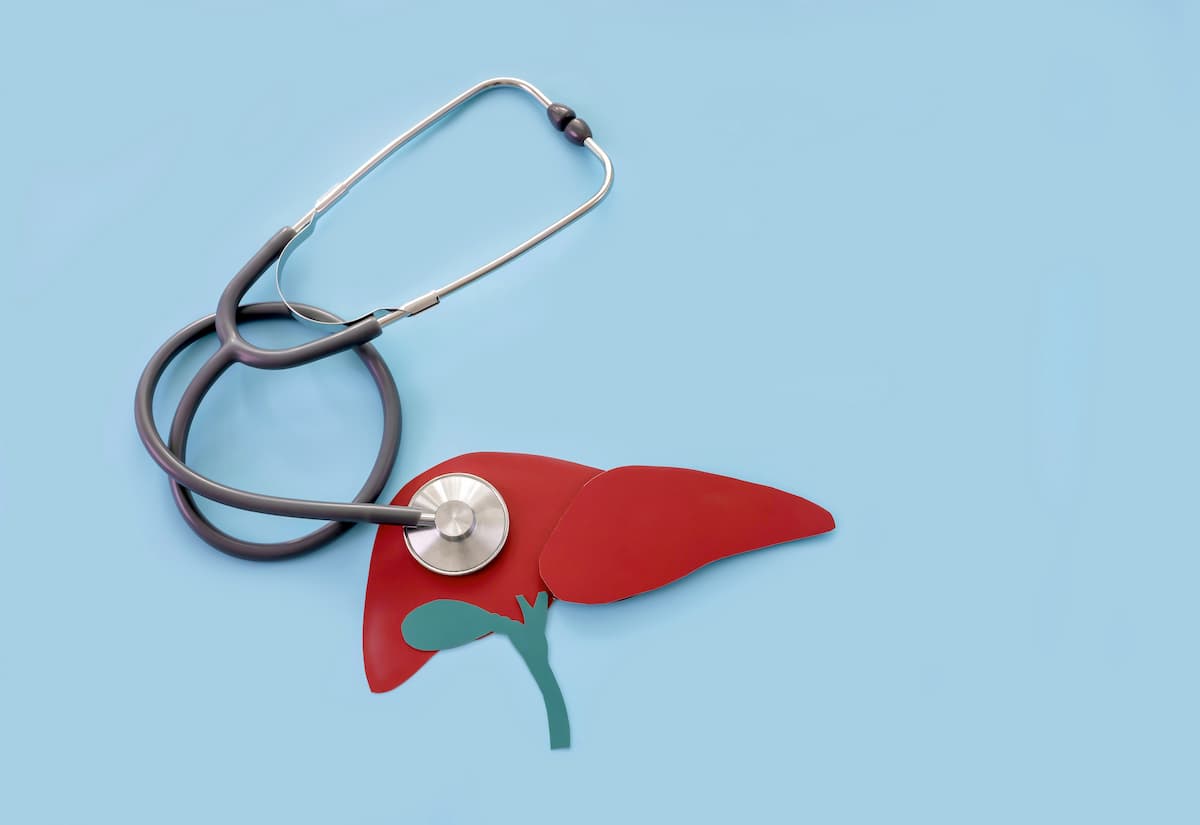
Liver tests are a test to assess the function of this organ. Find out when to perform them.
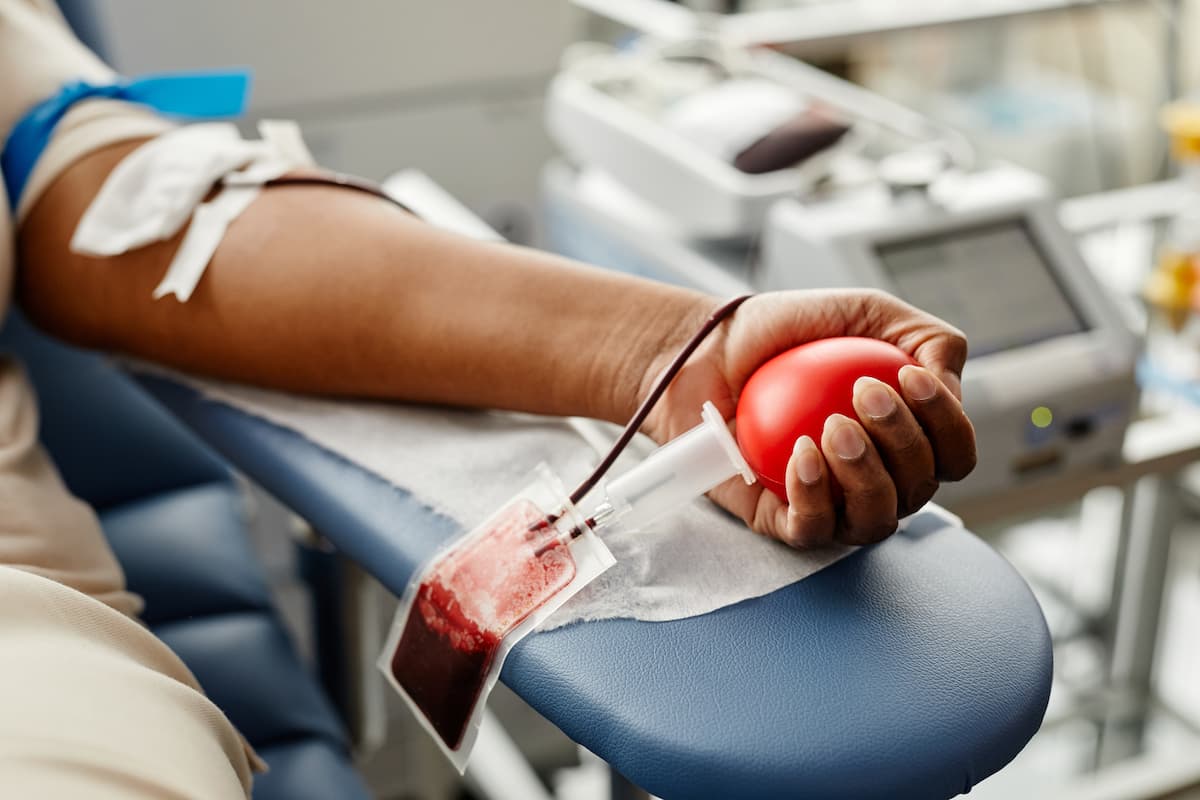
Blood tests can detect many conditions, monitor treatment and also assess the patient's general condition.

The thyroid doesn't hurt and the symptoms of disease can be easily ignored. Take care of prevention and get your thyroid tested.
